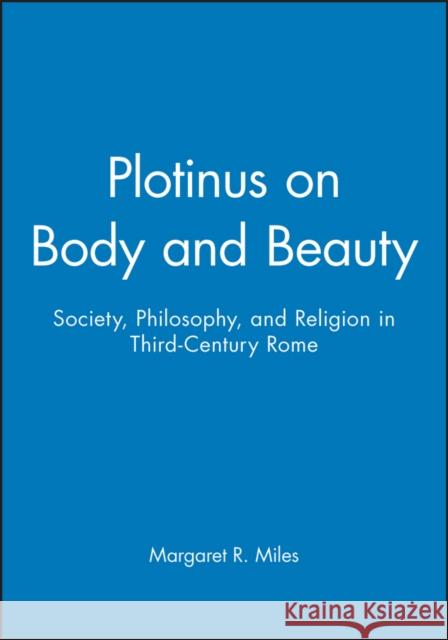Plotinus » książka



(netto: 714,79 VAT: 5%)
Najniższa cena z 30 dni: 740,39
ok. 16-18 dni roboczych.
Darmowa dostawa!
Miles brings Plotinus' thought alive for the twenty-first century by relating it to present day concerns.
Obwoluta
Wydanie ilustrowane
"This book puts a new and provocative perspective on the culture and intellectual world of late antiquity. With her interest in the body on the one hand, and her interest in pagan philosophy alongside Christian thought on the other, Miles is also able to open up Plotinus′ philosophy to our own postmodern times by relating the interest in the soul – for which Plotinus is famous – to that of the body as being necessarily complementary in any debate about human self." Willemien Otten, Utrecht University
"The author brings the ancient world alive. She does not gloss over the profound differences between ancient and modern societies, but at the same time points to some fascinating parallels. Anyone who reads Miles′s study will be asking questions about constructions of the "self" and one′s place in the universe. This beautifully written book displays a fine interdisciplinary sense and a grasp of ancient literature and contemporary scholarship that one can only admire." Margaret Y. MacDonald, St Francis Xavier University, Nova Scotia.
"This study is very nicely done and provides an excellent introduction to Plotinus′ thought. In brief, a strong, appealing, but not uncritical case for Plotinus as a secular theologian." Religious Studies Review
"This is a splendid, non–technical introduction to and interpretation of the central concerns of Plotinus′s philosophy. By sketching the social and cultural conditions of Plotinus′s third–century CE Rome, Margaret Miles achieves a convincing account. Highly recommended to historians, philosophers, and students of religion." International Review of Biblical Studies
"Sparked by the dramatic juxtaposition of Plotinus and the themes of body and beauty, drawing from career–long experience of teaching Plotinus, and writing with an eloquence and directness not unlike his own, Miles has convincingly demonstrated that Plotinus can indeed be a window between third–century Rome and the world of our own experience and concerns. More than that, she has written a thorough and dependable introduction to his philosophy." Journal of the American Academy of Religion
"This sympathetic and passionate reading of Plotinus deserves the attention of scholars and anyone interested in ancient religious thought. I recommend this animated and well–informed study of one of the great spirits of late antiquity." Journal of Religion
Preface.
1. Introduction: Seeing Double.
2. Beauty: The Stepping Stone.
3. ′Choice and Chance′: Soul as Pivot of the Universe.
4. Body in Third–century Rome.
5. Providence: Does the One Care for Us?.
6. ′Go on Up′: The One and Contemplation.
7. Plotinus for the Present.
Notes.
Bibliography.
Index of Passages, Plotinus.
Index of Names and Subjects.
Margaret R. Miles is Dean and d Academic Vice–President of the Graduate Theological Union, Berkeley, and is President of the American Academy of Religion. She was formerly Bussey Professor of historical Theology at Harvard University. Her previous books include Image as Insight: Visual Understanding in Western Christianity and Secular Culture, Carnal Knowing: female Nakedness and Religious Meaning in the Christian West, Seeing an Believing: Religion and values in the Movies, and, most recently, Reading for Life: Beauty, Pluralism, and Responsibility (1998).
Plotinus, the most profound philosopher of the third century C.E., has been influential on Byzantine and Western Christianity, and Islam. In the West, Augustine brought Plotinian philosophy into Christianity, ensuring the interest of a long line of Christian thinkers. As Margaret Miles shows, Plotinus s philosophy holds both perennial attraction and offers specific contributions to particular issues at the beginning of the twenty first century.
Miles offers a fresh interpretation which situates Plotinus s philosophical ideas in the context of society and culture in which those ideas developed. Using extant evidence (the Enneads, Porphyry s Life), she reconstructs an intense third–century conversation, n namely the relationship of body and soul. Mile s portrayal of Plotinus will encourage readers from a range of disciplines to question their construction of body, "self", and identity.
1997-2026 DolnySlask.com Agencja Internetowa
KrainaKsiazek.PL - Księgarnia Internetowa









